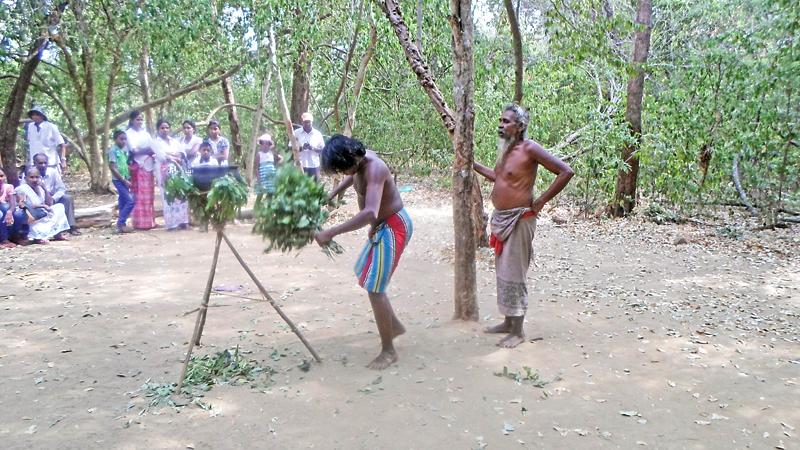
The World’s Indigenous People’s Day is celebrated globally on August 9. In Sri Lanka too, this day is celebrated every year under the sponsorship of the Government. But the Vedda Chieftain, Leader of the Indigenous Community Vishwa Keerthi, Wanaspathi Uruwarige Wanniyaleaththo sees this celebration as an occasion that is limited only to discuss the issues faced by the veddah people but not to find solutions to them.
The veddah Chief said that this day was celebrated last year with the usual festivities which saw the participation of indigenous communities who live in various veddah villages as well as government and private sector stakeholders. The issues of the indigenous communities were talked about and they were documented and they were even brought to the attention of the Presidential Secretariat. But nothing much has been done in terms of solving those issues.
Wanniyaleaththo said that the culture of Adivasis handed down from generation to generation for thousands of years is today likely to be swept away by the tide of globalisation.
 Uruwarige Wanniyaleaththo |
The veddah Chief said, “Our people live in Mahiyangana, Bintenna, Dambana, Mahaoya, Pollebedda Bibile, Nilgala, Rathugala, Panama, Polonnaruwa, Dimbulagala and Anuradhapura as well as in the Sabaragamuwa Province. Nearly 74 percent of the Veddas are Buddhists. While they follow their traditional rituals, they have close contacts with Buddhist temples. But it is sad to state that certain elements have converted some of our people living in Nilgala and Rathugala into different religions. This is mainly due to Evangelical cults in the region.”
Wanniyaleaththo said, “First they set up pre- schools for children. Later, people are converted into their cults. These elements tried several times to enter the Dambana village too. But I was able to chase them away. Although I have brought this matter to the notice of the authorities, no action has been taken to address the issue.”
He said that as forest dwellers, forest was their home for centuries. Then civilised men encroached the forest land in the name of development and even went on to demarcate what is forest and what is not. They also made rules and regulations banning our people from entering the forest. Today, the most frequent issue faced by the indigenous community is their constant clash with the authorities whenever they enter the forests.
I have discussed with the authorities several times regarding the issuing of a special identity card for the indigenous people so that their identity is secured as well as they can provide the identity card whenever they want to enter the forest.
Wanniyaleaththo said, “We are granted permission by the Wild Life Department once a year to enter the forest for the annual honey collection for the Dalada Maligawa, the sacred duty that is done parallel to the Kandy Esala Perahera every year. What we request from the authorities is to list some activities one can do and cannot do within a forest and give written permission at least for a few months of the year to carry out those activities within forests.”
They are deprived of their hunting grounds due to development projects and are limited to five acres per family.
They have fallen into difficulties trying to adapt to agricultural pursuits which they are not used to and have ended up selling these few acres of lands for a minimal amount to city folk and paying rent to them to live in the land that once belonged to them, which has become a social tragedy. Some of them sing a veddahsong or perform a veddah dance to buy their daily food. Selling traditional herbs and honey have also become some of their forms of subsistence.
Wanniyaleaththo said, “Steps have also been taken by the governments to develop the Dambana village. A cultural centre and a museum depicting the traditional heritage of the Adivasis have been constructed. A few wewas (tanks) have been renovated.
Roads in the Dambana village have been modernised. Samurdhi allowance is paid to some families. But our people are not satisfied with these facilities. They should be granted permission to enter the forest to enable them to lead their traditional forest life.”

Wariga Mahagedara (Adivasi Museum)
